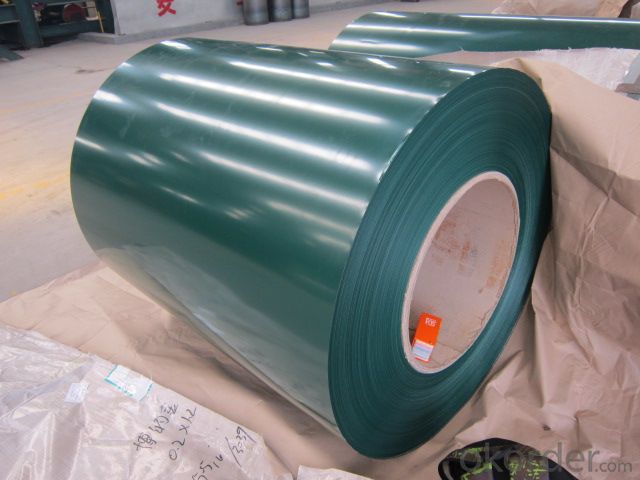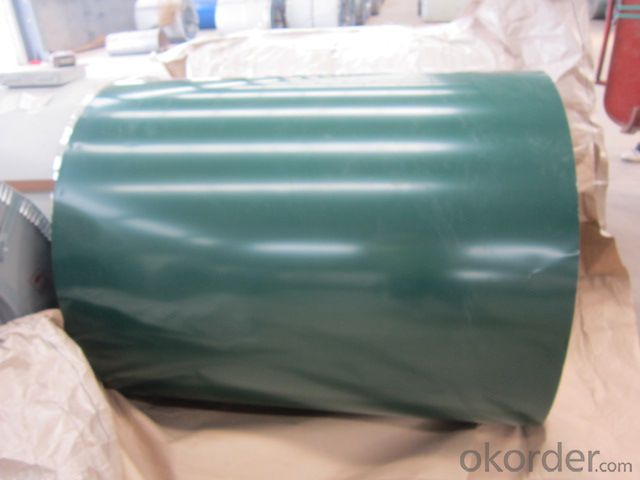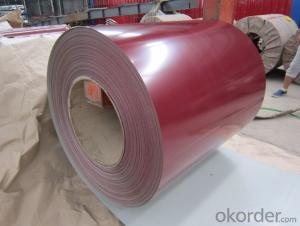Pre Painted Galvanized SteelCoil Colored
- Loading Port:
- Shanghai
- Payment Terms:
- TT OR LC
- Min Order Qty:
- 25 m.t.
- Supply Capability:
- 5000 m.t./month
OKorder Service Pledge
OKorder Financial Service
You Might Also Like
Description:
PPGI-Pre-painted galvanised iron is also known as pre-coated steel, typically with a hot dip zinc coated steel substrate.
Galvanization, or galvanisation, is the process of applying a protective zinc coating to steel or iron, to prevent rusting. The most common method is hot-dip galvanization, in which parts are submerged in a bath of molten zinc. Galvanizing protects in two ways:
It forms a coating of corrosion-resistant zinc which prevents corrosive substances from reaching the more delicate part of the metal.
The zinc serves as a sacrificial anode so that even if the coating is scratched, the exposed steel will still be protected by the remaining zinc.


Application:
Suitable for indoor or outdoor decoration, color lasting for at least 10 years for outdoor using, could for roll forming., conditioning, micro-wave oven, bread maker,solar water heater,condencing apparatus,Blackboard, white board,chalkboard, hidden cell blackboard,bulletin board,Central heating slice, lampshade, chifforobe, desk, bed, locker, bookshelf,garbage can, billboard, typewriter, instrument panel, weight sensor, photographic equipment,coffin, fence, Prepainted Galvanized Steel Coil
Product Specification:
Paint: PE or PVDF
Color pre painted steel in coil
Thickness: 0.3-0.8mm
Width: 914-1250mm
Inner Diameter: 508mm,610MM
Weight of Steel Coil: 3-8MT
Available Dipped Layer: 50-150g/m2
Coating Type: Al-Zn Alloy
Front Side Paint Thickness: 15-25μm
Back Side Paint Thickness: 5-10μm
Standard:JIS G3312,CGCC
FAQ:
1.How about the color of the Pre Painted Steel Coil
The color of the Pre Painted Steel Coil has a very wide selection, like orange, cream-colored, dark sky blue, sea blue, bright red, brick red, ivory white, porcelain blue.
2.Can you produce the goods according to the customer’s requirements?
Yes, of course, it can be customized according to customers requirements.
3.Could you tell me the package for the Pre Painted Steel Coil?
- Q:How are steel coils used in the HVAC industry?
- Steel coils are commonly used in the HVAC industry as a key component in air conditioning and heating systems. They are used to transfer heat energy, allowing the system to cool or heat the air efficiently. The steel coils act as heat exchangers, absorbing heat from the air and releasing it into the environment or vice versa. This process helps regulate the temperature and improve the overall performance of HVAC systems.
- Q:What is the role of steel coils in the manufacturing of bridges?
- Steel coils play a crucial role in the manufacturing of bridges as they are used to produce the beams and girders that provide the structural support and strength needed for the bridge. These coils are formed into various shapes and sizes, allowing for the customization required in bridge construction. Additionally, the high strength and durability of steel make it an ideal material for withstanding the heavy loads and harsh environmental conditions bridges are subjected to.
- Q:How are steel coils used in the manufacturing of electrical enclosures?
- Steel coils are used in the manufacturing of electrical enclosures as they provide a durable and strong material that can be formed into various shapes and sizes. These coils are typically cut and shaped to create the main structure of the enclosure, providing a protective housing for electrical components. The steel coils are often coated or painted to enhance their resistance to corrosion and increase their longevity.
- Q:What are the different types of steel coil treatments?
- Enhancing the properties and performance of steel coils involves various types of treatments. The treatments include: 1. Heat treatment known as annealing. It involves heating the steel coil to a specific temperature and gradually cooling it. This treatment alleviates internal stresses, enhances ductility, and boosts the overall strength of the coil. 2. Chemical treatment called pickling. It entails submerging the steel coil in an acid or chemical solution to eliminate impurities, scale, and rust from the surface. This treatment enhances the surface finish and cleanliness of the coil. 3. Application of a protective coating such as oil. A thin layer of oil or another protective substance is applied to the surface of the steel coil. This treatment prevents corrosion, improves lubricity, and safeguards the coil during storage and transportation. 4. Galvanizing, a process that involves coating the steel coil with a layer of zinc. This protective layer shields the coil from corrosion, creating a barrier between the steel and the surrounding environment. It ensures long-term durability and resistance to rust. 5. Tempering, a heat treatment process that includes heating the steel coil to a specific temperature and swiftly cooling it. This treatment enhances the toughness and strength of the coil, making it more resistant to impact and deformation. These are just a few instances of the various types of steel coil treatments commonly employed. Each treatment has its own unique purpose and advantages, and the choice of treatment will depend on the desired properties and applications of the coil.
- Q:please i need your help in answering this question manufacturing process of steel containers and 20 references
- There are many types of steel containers and many different mnfg processes. There are also thousands of different steel alloys. Steel is used for canned food, compressed air cyclinders, hydraulic pressure vessels, electrical boxes, and many other containers. Steel containers are made out of sheet metal by soldering, brazing, spot welding, seam welding, riveting, bolting, screwing, etc. Heavier wall containers are fabricated of plate steel. Some steel containers are made by deforming the steel by extruding, forging, spin forming, drawing, ironing, etc. Some steel containers are made by machining. You should be able to find plenty of references if you search for these terms. good luck
- Q:I'm getting my nose pierced, meaning that i have to keep the piercing in for a prolonged time. i've always had reactions when wearing sterling silver or fake earrings (i dont know what types of metal they were) after wearing it overnight. Will I get a reaction on my nose piercing if the stud is surgical steel?
- Good quality surgical steel reactions are rare. (has a lot less nickel than stainless steel) They have a teeny amount of nickel, but even the most serious reactors rarely have problems with it. Titanium has even less nickel. Niobium none (but that can be hard to find) Theres also quartz, which is fine to pierce with, but not for sports. I react to alot of cheap 'metals'. Which mostly end up being nickel plated. Like necklaces and belt buckles. Even some gold (which is nowhere near as good as people seem to think) Never had a problem with surgical steel or ti. I'd get titanium if you're worried. Its readily available.
- Q:What is the maximum length of a steel coil?
- The maximum length of a steel coil can vary depending on various factors such as the type of steel, manufacturing capabilities, and transportation logistics. However, in general, steel coils can be several hundred meters long, with some specialty coils exceeding a kilometer in length.
- Q:How are steel coils used in the production of electrical transmission poles?
- Steel coils are an essential component in the production of electrical transmission poles. These coils are made from high-quality steel and are used to fabricate the poles with the necessary strength and durability to withstand the demanding conditions of electrical transmission. Firstly, steel coils are used to manufacture the main body of the transmission poles. The coils are unrolled and shaped into large cylindrical sections, which are then welded together to form the pole's structure. This process allows for the creation of poles in various lengths, diameters, and wall thicknesses, catering to specific transmission requirements. The use of steel coils ensures that the transmission poles have the necessary structural integrity to support heavy electrical conductors and withstand environmental factors such as wind, ice, and seismic activities. Steel is known for its high strength-to-weight ratio, making it an ideal material for these poles, as it provides the required strength while keeping the pole relatively lightweight. Moreover, steel coils are also used to fabricate the flanges and brackets that are attached to the poles. These components are essential for securing and supporting the electrical conductors and insulators on the poles. By using steel coils, these flanges and brackets can be manufactured with precise dimensions and strength, ensuring a secure and reliable connection between the electrical components and the transmission poles. In addition to their structural benefits, steel coils also offer excellent corrosion resistance. This is crucial in the production of electrical transmission poles, as they are often exposed to harsh weather conditions and corrosive environments. Steel coils are typically coated with protective layers such as zinc or epoxy to prevent rust and corrosion, enhancing the lifespan of the transmission poles. In conclusion, steel coils play a vital role in the production of electrical transmission poles. They are used to fabricate the main body of the poles, as well as the flanges and brackets that secure the electrical components. With their high strength, durability, and corrosion resistance, steel coils ensure that transmission poles can safely and reliably support electrical conductors for the efficient transmission of electricity.
- Q:How are steel coils used in the production of automotive chassis?
- Steel coils are used in the production of automotive chassis as they provide the primary material for constructing the framework of the vehicle. These coils are first processed and shaped into the desired form, such as beams or plates, which are then welded together to form the chassis. The high strength and durability of steel make it an ideal choice for withstanding the stresses and loads experienced by the chassis, ensuring the safety and structural integrity of the vehicle.
- Q:How do steel coils contribute to the construction machinery industry?
- Steel coils are an essential component in the construction machinery industry. They play a crucial role in the manufacturing of heavy-duty machinery and equipment used in construction projects. One of the primary ways steel coils contribute to the construction machinery industry is through their use in the fabrication of structural components. These coils are often processed and shaped into beams, plates, and tubes, which form the framework of construction machinery. The strength and durability of steel make it an ideal material for these applications, as it can withstand heavy loads and harsh working conditions. Moreover, steel coils are also used in the production of various mechanical parts and components found in construction machinery. These include gears, shafts, axles, and hydraulic system components. The versatility of steel allows it to be easily machined and formed into complex shapes, enabling the creation of efficient and reliable machinery parts. In addition to its mechanical properties, steel coils also contribute to the construction machinery industry through their corrosion resistance. Construction machinery is often exposed to moisture, chemicals, and other environmental factors that can cause rust and deterioration. Steel coils with proper coatings or finishes can provide protection against corrosion, ensuring the longevity and performance of construction machinery. Furthermore, the availability and affordability of steel coils make them a preferred material for the construction machinery industry. Steel is widely produced and can be sourced from various suppliers, ensuring a steady supply chain. Its cost-effectiveness compared to other materials makes it an attractive option for manufacturers, allowing them to produce machinery at competitive prices. Overall, steel coils are vital to the construction machinery industry by providing strength, durability, corrosion resistance, and cost-effectiveness. Their use in the fabrication of structural components and mechanical parts ensures the reliability and efficiency of construction machinery, contributing to the growth and development of the industry.
1. Manufacturer Overview |
|
|---|---|
| Location | |
| Year Established | |
| Annual Output Value | |
| Main Markets | |
| Company Certifications | |
2. Manufacturer Certificates |
|
|---|---|
| a) Certification Name | |
| Range | |
| Reference | |
| Validity Period | |
3. Manufacturer Capability |
|
|---|---|
| a)Trade Capacity | |
| Nearest Port | |
| Export Percentage | |
| No.of Employees in Trade Department | |
| Language Spoken: | |
| b)Factory Information | |
| Factory Size: | |
| No. of Production Lines | |
| Contract Manufacturing | |
| Product Price Range | |
Send your message to us
Pre Painted Galvanized SteelCoil Colored
- Loading Port:
- Shanghai
- Payment Terms:
- TT OR LC
- Min Order Qty:
- 25 m.t.
- Supply Capability:
- 5000 m.t./month
OKorder Service Pledge
OKorder Financial Service
Similar products
New products
Hot products
Related keywords





























